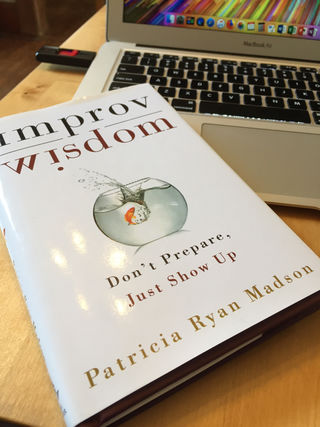Teamwork
Lessons from Improv Class
Improv has much to teach about life, collaboration, and creativity
Posted April 1, 2019
I've recently been taking some improv classes through The Hashtag Comedy Co. in Columbus, Ohio. I thought it would be fun to learn the basics of improv, to develop some useful skills. I had no idea, however, just how much improv would teach me about collaboration, creativity, and myself.

One of the first things I learned is that improv isn’t about being funny so much as it’s about working with others and creating something together.
A key principle of improv is “yes-and,” meaning we take what we’re given in a scene by those we’re working with and build on it. It’s a philosophy of acceptance and moving forward, of working together to create a world.
This principle is meaningful and useful both on stage and off. As Patricia Ryan Madson says in her book, Improv Wisdom: Don’t Prepare, Just Show Up, the “world of yes may be the single most powerful secret of improvising. It allows players who have no history with one another to create a scene effortlessly, telepathically. Safety lies in knowing your partner will go along with whatever idea you present.”
It’s a powerful lesson, and it works even in everyday relationships and interactions. It helps when we’re collaborating with others to accept whatever it is they bring to the table, and then to build on it.
Another key lesson I've learned is to listen—to really follow what others are saying, instead of always thinking about what I’m going to say next. In fact, in improv, we’re not supposed to think at all about what we’re going to say next. Anything can happen, and we need to spend most of the time listening to others so that we can build on what they’re saying and doing. Having something to say, after all, relies on knowing and understanding what others have already said.
Improv involves constant interaction between players, just as life's a constant interaction with others. Really listening is key to doing that successfully.
A third lesson I've learned is to always support others. Because improv involves continual collaboration, we need to provide a safe, supportive space in which to interact and create a world.
Finally, I've learned to trust my gut. To say the first thing that comes to mind. To not overthink a situation. This is maybe the hardest principle of all since I tend to always be worried about what I’m going to say or do, or what’s going to happen next. In improv, there’s no telling what will happen next, and you have to be ready to roll with just about anything.
One improv warm-up exercise we do involves facing each other, two at a time, and saying the first word that comes to mind. We move around the circle doing that, and eventually, two people will say the same word at the same time. That’s trusting our gut. Sometimes the first word you think of is the first word someone else is thinking of, and there’s a kind of magic when it happens.
It’s not easy to do any of these things, but improv skills can be acquired, developed, and strengthened with practice. Every Tuesday night, in an old renovated fire engine factory on the south side of Columbus, my classmates and I are practicing these skills, and I’m loving the process. It could be that it's making me a better improv performer, but more importantly, it’s making me a better person.
And besides, it’s just a lot of fun.


